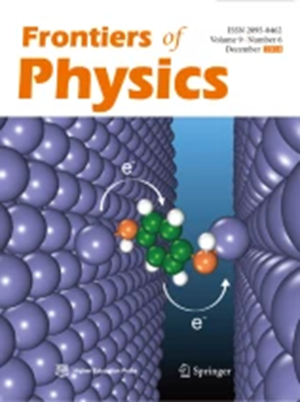Cost-sensitive classification algorithm combining the Bayesian algorithm and quantum decision tree
IF 6.5
2区 物理与天体物理
Q1 PHYSICS, MULTIDISCIPLINARY
引用次数: 1
Abstract
This study highlights the drawbacks of current quantum classifiers that limit their efficiency and data processing capabilities in big data environments. The paper proposes a global decision tree paradigm to address these issues, focusing on designing a complete quantum decision tree classification algorithm that is accurate and efficient while also considering classification costs. The proposed method integrates the Bayesian algorithm and the quantum decision tree classification algorithm to handle incremental data. The proposed approach generates a suitable decision tree dynamically based on data objects and cost constraints. To handle incremental data, the Bayesian algorithm and quantum decision tree classification algorithm are integrated, and kernel functions obtained from quantum kernel estimation are added to a linear quantum support vector machine to construct a decision tree classifier using decision directed acyclic networks of quantum support vector machine nodes (QKE). The experimental findings demonstrate the effectiveness and adaptability of the suggested quantum classification technique. In terms of classification accuracy, speed, and practical application impact, the proposed classification approach outperforms the competition, with an accuracy difference from conventional classification algorithms being less than 1%. With improved accuracy and reduced expense as the incremental data increases, the efficiency of the suggested algorithm for incremental data classification is comparable to previous quantum classification algorithms. The proposed global decision tree paradigm addresses the critical issues that need to be resolved by quantum classification methods, such as the inability to process incremental data and the failure to take the cost of categorization into account. By integrating the Bayesian algorithm and the quantum decision tree classification algorithm and using QKE, the proposed method achieves high accuracy and efficiency while maintaining high performance when processing incremental sequences and considering classification costs. Overall, the theoretical and experimental findings demonstrate the effectiveness of the suggested quantum classification technique, which offers a promising solution for handling big data classification tasks that require high accuracy and efficiency.结合贝叶斯算法和量子决策树的代价敏感分类算法
本研究强调了当前量子分类器在大数据环境中限制其效率和数据处理能力的缺点。本文提出了一个全局决策树范式来解决这些问题,重点是设计一个完整的量子决策树分类算法,该算法在考虑分类成本的同时准确高效。该方法结合贝叶斯算法和量子决策树分类算法对增量数据进行处理。该方法基于数据对象和成本约束动态生成合适的决策树。为了处理增量数据,将贝叶斯算法与量子决策树分类算法相结合,将量子核估计得到的核函数加入到线性量子支持向量机中,利用量子支持向量机节点(QKE)的决策有向无环网络构造决策树分类器。实验结果证明了所提出的量子分类技术的有效性和适应性。在分类精度、速度和实际应用影响方面,本文提出的分类方法优于竞争对手,与传统分类算法的准确率差异小于1%。随着增量数据的增加,该算法的精度提高,开销减少,其效率与以前的量子分类算法相当。所提出的全局决策树范式解决了量子分类方法需要解决的关键问题,例如不能处理增量数据和不能考虑分类成本。该方法将贝叶斯算法与量子决策树分类算法相结合,采用QKE方法,在处理增量序列并考虑分类成本的情况下,保持了较高的精度和效率。总的来说,理论和实验结果证明了所建议的量子分类技术的有效性,它为处理需要高精度和高效率的大数据分类任务提供了一个有前途的解决方案。
本文章由计算机程序翻译,如有差异,请以英文原文为准。
求助全文
约1分钟内获得全文
求助全文
来源期刊

Frontiers of Physics
PHYSICS, MULTIDISCIPLINARY-
CiteScore
9.20
自引率
9.30%
发文量
898
审稿时长
6-12 weeks
期刊介绍:
Frontiers of Physics is an international peer-reviewed journal dedicated to showcasing the latest advancements and significant progress in various research areas within the field of physics. The journal's scope is broad, covering a range of topics that include:
Quantum computation and quantum information
Atomic, molecular, and optical physics
Condensed matter physics, material sciences, and interdisciplinary research
Particle, nuclear physics, astrophysics, and cosmology
The journal's mission is to highlight frontier achievements, hot topics, and cross-disciplinary points in physics, facilitating communication and idea exchange among physicists both in China and internationally. It serves as a platform for researchers to share their findings and insights, fostering collaboration and innovation across different areas of physics.
 求助内容:
求助内容: 应助结果提醒方式:
应助结果提醒方式:


